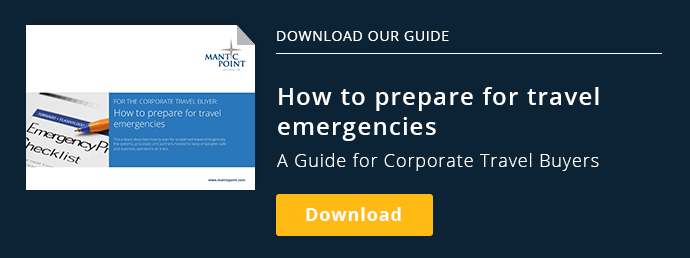6 crucial communication tips for travel risk managers
Posted by Mike Atherton on 14 December, 2015

Communication is absolutely key to managing traveller itineraries when your employees are working overseas – especially in emergency situations.
As a risk manager, you need to ensure that you are prepared for such times, and your team has the ability to provide useful, relevant and timely communication to alleviate travel risk and potential employee distress.
Here are six tips to help you provide effective communication.
1. It starts at the booking
In our recent survey of business travellers, over 50% said they did not receive any pre-trip information before travelling. But straight after booking is when communication should start. Your travellers should be provided with briefing information wherever they travel, especially if there are any alerts in place for their travel destinations. It’s a good idea to brief employees on customs of their countries of travel (this presentation summarises some important cultural differences).
2. Changes? Communicate
Our survey also overwhelmingly highlighted that business travellers want to be kept informed of changing circumstances and travel risks once their trip has started. Whether it be changes to transport arrangements or potential developments of risk – perhaps due to political unrest or extreme weather – you must effectively communicate changes to your employees.
3. Stay relevant
Don’t broadcast your communications – send targeted messages only to those who need them, so they get the right information at the right time. Recipients are likely to disregard all messages if they are continuously sent irrelevant information, which is a risk in itself. By using a rules based system to determine who receives what, you avoid sending irrelevant communications to travellers.
4. Be timely
How do you ensure that you know about developments in risk or changes to an employee’s travel arrangements as soon as possible? Through email alerts. Email alerts are key to providing travellers with rapid, targeted support, when a change in circumstances occurs. Configure an effective set of rules so your response team receives alerts and is able to formulate communications.
5. Keep a record
Not only is it vital that you keep a record of all of your communications with travelling employees for auditing – to provide evidence to your stakeholders of your corporate social responsibility, it’s also important to keep a record for you to review too. By evaluating your communications, you can continue to refine the support you provide to employees when they’re abroad, and so you effectively fulfil your duty of care responsibilities.
6. Update your rules
The set of rules you implement that determine when alerts are issued should continuously be evaluated and developed, in response to business environment changes. It’s only through such monitoring that you can be sure your team is properly alerted to potential risk that could affect employees.
For further expert advice on how to prepare for unplanned travel emergencies, ensuring your employees are safe and protected, download our guide for corporate travel bookers.


